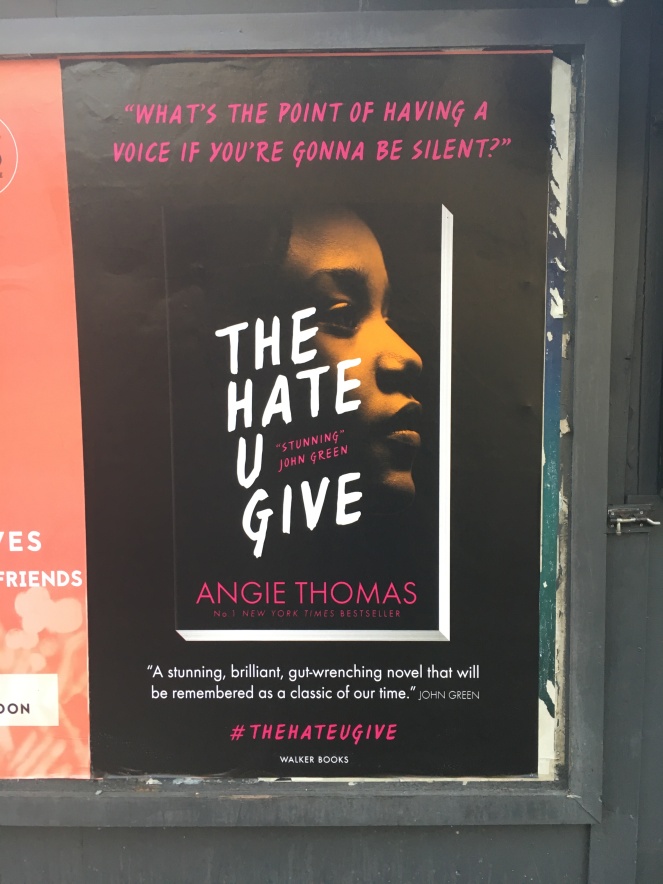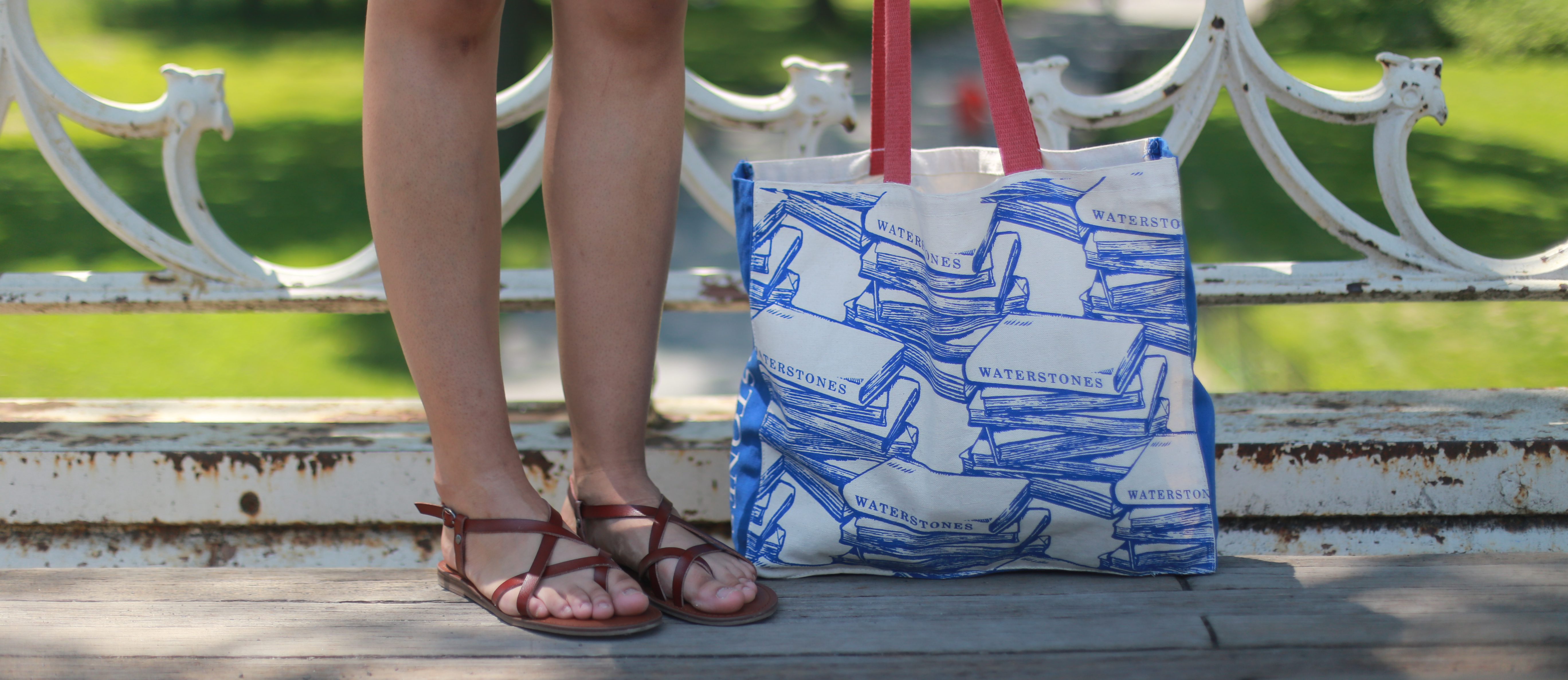“Once upon a time there was a hazel-eyed boy with dimples. I called him Khalil. The world called him a thug.”

The Hate U Give is taking the world by storm. Appropriately published at the end of Black History Month, Angie Thomas paints a vivid portrait of 16-year old Starr Carter as she navigates the ins and outs of being a teenager. Starr has average teenage concerns about friendships and sometimes fighting, her boyfriend and maybe taking the next step. She also lives between two worlds: the black neighborhood she calls home and her elite, predominately white high school. You likely already know this part of the story: Starr is the only witness as her childhood best friend Khalil, unarmed, is killed by a cop. This story is sadly not an unusual one, but to read about it in a novel from a young woman’s perspective is certainly different. Remarkable, even.
Objectively, The Hate U Give is just a really good book. It’s clever and well-written. It’s a portrait of a complex family. The characters are well-developed, unique, and you want to root for them. It is fraught and emotional, and leaves room for no complaints. The Hate U Give is an achievement: in part because it’s a spectacular debut novel and it’s spent more weeks as a #1 New York Times bestseller than not, but mostly because her book is an essential part of young adult literature, black literature, and American literature.
Reading The Hate U Give, I cried, I laughed, gasped in shock, and I felt a little bit more complete. I know I’m not alone in this experience. It’s hard to describe just how good it feels to be seen and understood. I loved reading THUG because Angie Thomas gets what it’s like to be me. You almost—almost—don’t notice your narrative is missing from the mainstream until it’s finally playing out in front of you.
Starr is such a dynamic character that it would be hard not to like her, but it doesn’t hurt that she and I both love Harry Potter and Lebron James, or that she and my brother both play basketball and have a passion for sneakers that I will probably never completely understand. A reader can tell Thomas’s book is a labor of love (though that’s not to say that writing it was easy), with careful attention paid to detail. Most people can probably find some
For me, the connection goes deeper. As a black reader, I see my dad in Maverick Carter, a man who might not have always made the best decisions but knows how to protect his kids no matter what. I fear for my dad as Starr fears for Maverick that day in front of his grocery store. As a student attending an elite college on a massive financial aid package, I see myself in Starr and her discomfort when interacting with friends who are much wealthier than her. Though I don’t live between two worlds in the same way that Starr does, I know my own sense of in-between as a biracial black girl.
Thomas set out to give black girls a mirror—since black girls are often left out of books and of conversations about police brutality. Though THUG was written especially for black girls, that doesn’t mean it’s only for them. THUG is for people of all ages, races, orientations, religions, and abilities with positive messages like this one: “I can’t change where I come from or what I’ve been through, so why should I be ashamed of what makes me, me?” Since my life is vastly different from Starr’s, Thomas has offered me both a mirror and a window. For everyone who doesn’t know what it is to be black, her novel is a powerful and unapologetic window into aspects of black culture and the unfair realities we face.
I’m so glad that The Hate U Give exists, and I’m ready for more stories to move from the margins to the forefront. Black girls are not the only ones who need mirrors, and they are not the only ones who have been wronged by bad representation.
In recent months, book Twitter has had conversations about harmful representation in Carve the Mark, The Continent, Sad Perfect, All the Crooked Saints, The Black Witch, and I’m sure some I’m forgetting. Book Twitter can be a great place to be, if you’re following the right people. I could name an amazing #ownvoices book for each of those problematic ones—The Girl from Everywhere, Warcross (forthcoming), Shadowshaper, History is All You Left Me, The Sun is Also a Star—and I could go on for a while. Own voices helps us understand that not only do we need diverse books, but we need diverse authors writing them, and it is championed across book Twitter. I’m optimistic about the future of children’s books. I dream of a world where harmful book proposals get rejected, all impressionable kids can see themselves as the hero instead of the sidekick, and those working in the industry are an accurate representation of those who they are publishing books for.
In THUG, one of Starr’s friends asks her, “What’s the point of having a voice if you’re gonna be silent in those moments you shouldn’t be?” We should all challenge ourselves to use our voices, as challenging as speaking out may be. Though there are plenty of pressing issues to talk about right now, improving children’s literature is perhaps the one I am best equipped to approach. Since I’m and English student, an education student, and first and foremost a reader, I’ve got a lot of tools to think about how books can be better.
The books that are better can be very powerful: Nicola Yoon said in an interview on writing YA fiction that books breed empathy, and she is correct. Books do breed empathy; they also educate and form identity. When you see yourself in a book, you feel valued and your horizons expand, whether it’s believing that you too could be an author or just that you are worthy of finding love. The same could be said of other art forms. Stories should not be underestimated.
I’ll leave you with this: “You can destroy wood and brick, but you can’t destroy a movement.” Black Lives Matter and We Need Diverse Books are important movements. Both started by women of color, both prepared to soldier on. We Need Diverse Books is a movement aiming to change lives. I have no doubt that it will, and already has. The Hate U Give is one successful example and books like it both shift the mainstream narrative and help pave the way for books that will come after them.
An original version of this piece appeared in the April 2017 issue of Counterpoint at Wellesley College.

